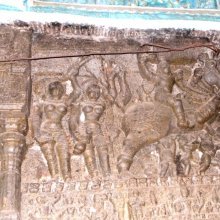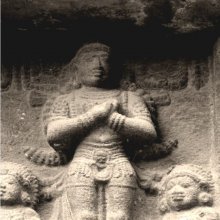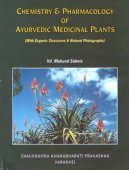Are, Āre: 20 definitions
Introduction:
Are means something in Hinduism, Sanskrit, Buddhism, Pali, the history of ancient India, Marathi, Jainism, Prakrit, Hindi, biology. If you want to know the exact meaning, history, etymology or English translation of this term then check out the descriptions on this page. Add your comment or reference to a book if you want to contribute to this summary article.
Images (photo gallery)
(+959 more images available)
India history and geography
Source: Project Gutenberg: Castes and Tribes of Southern India, Volume 1Are (“bauhinia racemosa”) is one of the gotras (clans) among the Kurnis (a tribe of South India). Kurni is, according to the Census Report 1901, “a corruption of kuri (sheep) and vanni (wool), the caste having been originally weavers of wool”. The gotras (viz., Are) are described as being of the Brāhman, Kshatriya, and Vaisya sub-divisions of the caste, and of Shanmukha’s Sudra caste.

The history of India traces the identification of countries, villages, towns and other regions of India, as well as mythology, zoology, royal dynasties, rulers, tribes, local festivities and traditions and regional languages. Ancient India enjoyed religious freedom and encourages the path of Dharma, a concept common to Buddhism, Hinduism, and Jainism.
Biology (plants and animals)
Source: Wisdom Library: Local Names of Plants and DrugsAre [ಆರೆ] in the Kannada language is the name of a plant identified with Woodfordia fruticosa (L.) Kurz from the Lythraceae (Crape Myrtle) family having the following synonyms: Woodfordia floribunda. For the possible medicinal usage of are, you can check this page for potential sources and references, although be aware that any some or none of the side-effects may not be mentioned here, wether they be harmful or beneficial to health.
Source: Google Books: CRC World Dictionary (Regional names)1) Are in India is the name of a plant defined with Bauhinia racemosa in various botanical sources. This page contains potential references in Ayurveda, modern medicine, and other folk traditions or local practices It has the synonym Piliostigma racemosum (Lam.) Benth. (among others).
2) Are is also identified with Bauhinia malabarica It has the synonym Piliostigma malabaricum (Roxb.) Benth. (etc.).
3) Are is also identified with Bauhinia semla It has the synonym Phanera retusa (Roxb.) Benth. (etc.).
4) Are in Yoruba is also identified with Aleurites moluccana It has the synonym Camerium moluccanum (L.) Kuntze (etc.).
Example references for further research on medicinal uses or toxicity (see latin names for full list):
· Ann. Inst. Bot.-Géol. Colon. Marseille, (1911)
· Linnaea (1841)
· Kew Bulletin (1966)
· Taxon (1976)
· Plantae Junghuhnianae (1852)
· Fl. Bras. (Martius) (1870)
If you are looking for specific details regarding Are, for example side effects, extract dosage, pregnancy safety, chemical composition, diet and recipes, health benefits, have a look at these references.

This sections includes definitions from the five kingdoms of living things: Animals, Plants, Fungi, Protists and Monera. It will include both the official binomial nomenclature (scientific names usually in Latin) as well as regional spellings and variants.
Languages of India and abroad
Pali-English dictionary
Source: BuddhaSasana: Concise Pali-English Dictionaryare : (ind.) he! hollo! I say!
Source: Sutta: The Pali Text Society's Pali-English DictionaryAre, (indecl.) (onomat. Cp. Sk. lalallā, Gr. lalέw, Lat. lallo = E. lull, Ger. lallen & without redupl. Ags. holā, Ger. halloh, E. lo. An abbrev. form of are is re. Cf. also alālā) exclam. of astonishment & excitement: he! hallo! I say!, implying an imprecation: Away with you (with Voc.) J. I, 225 (dāsiputta-ceṭaka); IV, 391 (duṭṭha-caṇḍāla); DA. I, 265 (= re); VvA. 68 (dubbinī), 217 (“how in the world”). (Page 78)

Pali is the language of the Tipiṭaka, which is the sacred canon of Theravāda Buddhism and contains much of the Buddha’s speech. Closeley related to Sanskrit, both languages are used interchangeably between religions.
Marathi-English dictionary
Source: DDSA: The Molesworth Marathi and English Dictionaryarē (अरे).—ind (S) A contemptuous or familiar particle of calling or addressing (a male); corresponding with Oh you! You Sir! You fellow! Sirrah! If affixed to the name, a is dropped. Pr. arē tara kāṃrē ahō tara kāya hō. arē arē karaṇēṃ To forbid, warn, caution &c. arē- jārē with bōlaṇēṃ, mhaṇaṇēṃ &c. To thee and thou a person.
Source: DDSA: The Aryabhusan school dictionary, Marathi-Englisharē (अरे).—ind A contemptuous or familiar particle of calling a male.
Marathi is an Indo-European language having over 70 million native speakers people in (predominantly) Maharashtra India. Marathi, like many other Indo-Aryan languages, evolved from early forms of Prakrit, which itself is a subset of Sanskrit, one of the most ancient languages of the world.
Sanskrit dictionary
Source: DDSA: The practical Sanskrit-English dictionaryAre (अरे).—ind. An interjection of (a) calling to inferiors; आत्मा वा अरे द्रष्टव्यः श्रोतव्यः, न वा अरे पत्युः कामायास्याः पतिः प्रियो भवति (ātmā vā are draṣṭavyaḥ śrotavyaḥ, na vā are patyuḥ kāmāyāsyāḥ patiḥ priyo bhavati) Śat. Br. (said by Yajñavalkya to his wife Maitreyī); Bṛ. Up 2.4.4. (b) of anger; अरे महाराजं प्रति कुतः क्षात्रियाः (are mahārājaṃ prati kutaḥ kṣātriyāḥ) Uttararāmacarita 4; (c) of envy.
--- OR ---
Āre (आरे).—ind. Ved.
1) Far, far from, (with abl.).
2) Near.
Source: Cologne Digital Sanskrit Dictionaries: Shabda-Sagara Sanskrit-English DictionaryAre (अरे).—ind. Interjection of calling to inferiors.
Source: Cologne Digital Sanskrit Dictionaries: Benfey Sanskrit-English DictionaryAre (अरे).—interj. of calling to inferiors, sirrah! [Prabodhacandrodaya, (ed. Brockhaus.)] 24, 8.
Source: Cologne Digital Sanskrit Dictionaries: Cappeller Sanskrit-English DictionaryAre (अरे).—[adjective] vocat. particle.
--- OR ---
Āre (आरे).—([locative] [adverb]) far, far from ([ablative]).
Source: Cologne Digital Sanskrit Dictionaries: Monier-Williams Sanskrit-English Dictionary1) Are (अरे):—ind. interjection of calling, [Vājasaneyi-saṃhitā; Śatapatha-brāhmaṇa etc.] (cf. arare, arere, and re).
2) Āre (आरे):—[from ār] a See ss.vv.
3) b ind. ([locative case]; See ārāt) far, far from, outside, without, [Ṛg-veda; Atharva-veda]
4) near, [cf. Lexicographers, esp. such as amarasiṃha, halāyudha, hemacandra, etc.]
Source: Cologne Digital Sanskrit Dictionaries: Yates Sanskrit-English DictionaryAre (अरे):—interj. Oh to inferiors.
Source: DDSA: Paia-sadda-mahannavo; a comprehensive Prakrit Hindi dictionary (S)Are (अरे) in the Sanskrit language is related to the Prakrit words: Are, Hare.
[Sanskrit to German]
Sanskrit, also spelled संस्कृतम् (saṃskṛtam), is an ancient language of India commonly seen as the grandmother of the Indo-European language family (even English!). Closely allied with Prakrit and Pali, Sanskrit is more exhaustive in both grammar and terms and has the most extensive collection of literature in the world, greatly surpassing its sister-languages Greek and Latin.
Hindi dictionary
Source: DDSA: A practical Hindi-English dictionaryAre (अरे):—(int) O !, a form of address (used for inferiors or juniors); -[are] stop this !, what is that !, why are you doing that ?
...
Prakrit-English dictionary
Source: DDSA: Paia-sadda-mahannavo; a comprehensive Prakrit Hindi dictionary1) Are (अरे) in the Prakrit language is related to the Sanskrit word: Are.
2) Are (अरे) also relates to the Sanskrit word: Are.
Prakrit is an ancient language closely associated with both Pali and Sanskrit. Jain literature is often composed in this language or sub-dialects, such as the Agamas and their commentaries which are written in Ardhamagadhi and Maharashtri Prakrit. The earliest extant texts can be dated to as early as the 4th century BCE although core portions might be older.
Kannada-English dictionary
Source: Alar: Kannada-English corpusAre (ಅರೆ):—
1) [verb] to reduce to powder or fine particles by crushing and friction; to grind; to powder; to pulverise.
2) [verb] to crush or squeeze (as a sugar cane, leaves, to get juice out); to work up (flour, clay etc.) into a plastic mass (dough) by pressing and folding it with the hands; to knead.
3) [verb] to be reduced to powder.
4) [verb] to be distorted; to lose one’s original form or shape.
5) [verb] to cause to study laboriously; to teach thoroughly.
6) [verb] ಅರೆದುಕುಡಿ [aredukudi] aredukuḍi to learn or study thoroughly; ಅರೆದುಕುಡಿಸು [aredukudisu] aredukuḍisu to teach thoroughly; ಅರೆದುಹೊಯ [areduhoya](ಯ್ಯಿ [yyi]) areduhoy(yyi) to teach thoroughly; ಅರೆದವ ಕುಡಿದಾನು [aredava kudidanu] aredava kuḍidānu (prov.) as you brew, so you must drink.
--- OR ---
Are (ಅರೆ):—
1) [noun] a large mass of stone.
2) [noun] an open excavation for building stone, slate etc.; any source of building stone; a quarry;3) [noun] ಅರೆ ಆಳು [are alu] are āḷu half the turnover or quantum of work a normal person can do in a day; ಅರೆ ಉಣಿಸು [are unisu] are uṇisu insufficient food; ಅರೆಮಾಡು [aremadu] aremāḍu to make incomplete; to stop a job without completing; ಅರೆಯಾಗು [areyagu] areyāgu to become deficient; to be incomplete.
--- OR ---
Are (ಅರೆ):—
1) [noun] either of two equal parts into which a thing or quantity is or may be divided; a half.
2) [noun] that which is not a whole (not necessarily being half).
3) [noun] a few things (uncertain ones).
4) [noun] a falling short; deficit, insufficiency; deficiency.
--- OR ---
Are (ಅರೆ):—
1) [noun] a recess or hollow in a wall, as for a statue, bust or vase; a niche.
2) [noun] a space within a building enclosed by walls or separated from other similar spaces by walls or partitions; a room.
3) [noun] a sliding box in a table, bureau, chest, etc., that can be drawn out and then pushed back into place; a drawer.
4) [noun] a kind of percussion instrument, used in folk-dance.
--- OR ---
Are (ಅರೆ):—[noun] want of digestive power; inability to digest food.
--- OR ---
Are (ಅರೆ):—[noun] any one of the rods connecting the hub with the rim of a wheel; a spoke.
--- OR ---
Are (ಅರೆ):—
1) [adverb] somewhere; at some place.
2) [adverb] sometime; at some unspecified time.
3) [adverb] a few; not many; in small, limited or restricted number.
4) [adverb] ಅರೆಬರ್ [arebar] arebar (pl.) a few people.
--- OR ---
Are (ಅರೆ):—
1) [adjective] half a) being either of the two equal parts; b) being about a half of the amount, length, etc.
2) [adjective] incomplete; fragmentary; partial.
--- OR ---
Are (ಅರೆ):—[interjection] an interjection expressing wonder or objection.
--- OR ---
Are (ಅರೆ):—[verb] to be missed; to be lost.
--- OR ---
Are (ಅರೆ):—[noun] a sand bank.
--- OR ---
Are (ಅರೆ):—[noun] the plant Grislea tomentosa.
--- OR ---
Aṟe (ಅಱೆ):—
1) [verb] to become dry.
2) [verb] to lose one’s original form or shape.
3) [verb] to be out of sight; to disappear; to be not seen.
--- OR ---
Aṟe (ಅಱೆ):—
1) [verb] to hit hard with the hand or a tool, weapon etc.; to beat heavily; to bang.
2) [verb] ಅಱೆಯೊತ್ತು [areyottu] aṛeyottu to flatten; to shape by beating; 2. to pat, stroke quickly or gently, esp. with the hand, as in applying oil on another’s head or body.
--- OR ---
Aṟe (ಅಱೆ):—[noun] a heavy stroke; a hard blow.
--- OR ---
Aṟe (ಅಱೆ):—[noun] = ಅಱೆಗಲ್ [aregal].
--- OR ---
Āre (ಆರೆ):—[noun] a long metal bar with wedge-shaped end on one side, used to dig the earth; a crow-bar.
--- OR ---
Āre (ಆರೆ):—[noun] a small hoof attached behind the hoofs of cattle, horse etc.; a mini-hoof.
--- OR ---
Āre (ಆರೆ):—
1) [noun] a leather cutting tool; an awl.
2) [noun] a small knife.
3) [noun] a sharp-pointed stick used in driving and controlling elephants; a goad.
--- OR ---
Āre (ಆರೆ):—
1) [noun] one of the radiating bars of a wheel of a cart; a spoke.
2) [noun] (arith.) a straight line joining the centre and any point on the circumference of a circle; a radius.
3) [noun] a line joining the origin (i.e. observer’s point) and the object moving on a curved line; a line from a fixed point to a point on a curve; a radius.
--- OR ---
Āre (ಆರೆ):—
1) [noun] a person of noble family or noble conduct.
2) [noun] name of a sect or a sub-caste.
3) [noun] a member of Marāṭha military caste, settled in Karnāṭaka.
--- OR ---
Āre (ಆರೆ):—[noun] a bushy plant Woodfordia fruticosa ( = W. floribunda, = Lythrum fructicosum of Lythraceae family; fire flame bush.
Kannada is a Dravidian language (as opposed to the Indo-European language family) mainly spoken in the southwestern region of India.
Nepali dictionary
Source: unoes: Nepali-English DictionaryAre (अरे):—interj. 1. 'I say!'; 'hello!' (for attracting, attention); 2. 'oh!' (expressing astonishment/concern); 3. indicating lack of confirmation;
Nepali is the primary language of the Nepalese people counting almost 20 million native speakers. The country of Nepal is situated in the Himalaya mountain range to the north of India.
See also (Relevant definitions)
Starts with (+321): Agalte, Arayagha, Arayavadya, Are alu, Are ibeji, Are maradala, Areagha, Arealu, Areavadya, Arebada, Arebalavi, Arebali, Arebar, Arebarakala, Arebare, Arebbayi, Arebe, Arebettale, Arebevu, Arebhashe.
Ends with (+1129): Aadasare, Aakaasha thaamare, Aakala kaare, Aakala-kaare, Aankh-taare, Aare, Abamdare, Abare, Abhidhanaparampare, Abhipare, Abhisvare, Abhyacare, Abhyagare, Abunare, Acalatare, Accadavare, Accare, Aconitum naviculare, Adachaare, Adachare.
Full-text (+41236): Bala, Dhatu, Varna, Rasa, Guna, Bhava, Krishna, Yaksha, Agni, Areshatru, Kala, Dravya, Jati, Vishesha, Surya, Yoga, Mala, Arayavadya, Deva, Purana.
Relevant text
Search found 577 books and stories containing Are, Arē, Āre, Aṟe; (plurals include: Ares, Arēs, Āres, Aṟes). You can also click to the full overview containing English textual excerpts. Below are direct links for the most relevant articles:
Rig Veda (translation and commentary) (by H. H. Wilson)
Chaitanya Bhagavata (by Bhumipati Dāsa)
Verse 2.19.145 < [Chapter 19 - The Lord’s Pastimes in Advaita’s House]
Verse 2.18.41 < [Chapter 18 - Mahāprabhu’s Dancing as a Gopī]
Verse 2.19.131 < [Chapter 19 - The Lord’s Pastimes in Advaita’s House]
Significance of the Moon in Ancient Civilizations (by Radhakrishnan. P)
16. The Moon and National Flags < [Chapter 3 - History of Civilizations and Moon]
16. Conclusion < [Chapter 15 - Conclusion]
3. The Karma and Results < [Chapter 4 - Contemporary Astrological Viewpoint and Moon]
Manasara (English translation) (by Prasanna Kumar Acharya)
Chapter 60 - The goose (haṃsa-lakṣaṇa)
Chapter 69 - The penalties for defective construction (aṅga-dūṣaṇa)
Rudra-Shiva concept (Study) (by Maumita Bhattacharjee)
1. Ṛgveda (d): Malevolent aspects of Rudra < [Chapter 2 - Rudra-Śiva in the Saṃhitā Literature]
42. Number of Rudra < [Chapter 5 - Rudra-Śiva in the Purāṇic Literature]
10. Rudra and the Sviṣṭakṛt offering of the Aśvamedha sacrifice < [Chapter 3 - Rudra-Śiva in the Brāhmaṇa Literature]
Bhagavati-sutra (Viyaha-pannatti) (by K. C. Lalwani)
Related products
(+311 more products available)











